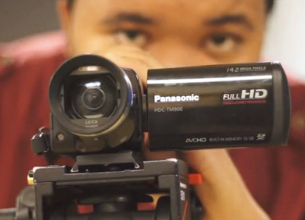From 2010-2013, a team of researchers at the Media Education Lab conducted an  evaluation of the PBS NewsHour Student Reporting Labs program.
evaluation of the PBS NewsHour Student Reporting Labs program.
CLick here to Read the Evaluation Report
PUBLICATIONS:
Hobbs, R., Donnelly, K., Friesem, J. & Moen, M. (2013). Learning to engage: How positive attitudes about the news, media literacy and video production contribute to adolescent civic engagement. Educational Media International 50(4), 231 – 246.
Hobbs, R. (2016). When teens create the news: Examining the impact of PBS News Hour Student Reporting Labs. Journalism Education 5(1), 61 – 73.
The PBS NewsHour Student Reporting Labs program connects middle and high school students to local PBS stations and broadcast news professionals in their communities to report on critical issues from a youth perspective. Through a project-based, active learning model, students learn how to synthesize information and investigate important topics, while building media literacy, communication, and problem-solving skills necessary for the knowledge economy of the 21st century. The program involves more than 50 schools and community centers across the country and each site has adapted the program to meet the particular educational needs of its students, faculty and community.
The intended goals of the PBS NewsHour Student Reporting Labs program are to help students gain a better understanding of what constitutes news; evaluate the credibility of the information they receive via news content; strengthen their appreciation for the norms of professional journalism; and build skills and confidence as communicators through learning how to produce news content in a collaborative real-world environment where what they create may be viewed by an authentic large audience and publication becomes the ultimate assessment.
Students participating in the program have videos on a variety of topics, ranging from Free Speech in Rick Ross's music to a student walkout in Minnesota to ocean acidity levels. View more samples of student work on the Student Reporting Labs website.
The Media Education Lab conducted the program evaluation which involved multiple assessment strategies, including viewing student productions, conducting qualitative interviews with participants, observing and documenting teacher professional development sessions, and conducting online survey research with students participating in the program.
Our report describes the results of a large-scale pre-test–post-test study of students and teachers who participated in the program during the 2012–2013 academic year. The online survey instrument evaluated student media behavior, attitudes, and learning outcomes. Using a combination of scaled multiple-choice items and performance-based tasks, the instrument addressed news media consumption, production skills, program experiences, life skills, media literacy competencies, attitudes toward news media, civic engagement, attitudes toward education, and demographics.
Findings from pre‐post quantitative research conducted with nearly 500 high school students who participated in the program reveal:
1) The development of media production skills that involved gathering and
synthesizing information, using digital media and technology to communicate
ideas in the format of a broadcast news package, and engaging in cycles of
revision and feedback to polish their work.
2) Significant increases in collaboration and teamwork competencies, including
intellectual curiosity, the ability to give and receive feedback, and confidence in
self-expression and advocacy.
3) Increases in media literacy analysis skills, more selectivity in media use choices, and a shift towards high‐quality news sources over entertainment-type news.
4) A less apathetic view of news and journalism, as well as orientation toward
journalism careers.
5) Increased commitment to civic activism and an interest in civic engagement
activities, particularly ones that are digital and collaborative.
This project was led by Online NewsHour Managing Editor for Education, Leah Clapman. She has worked on the television side of "The MacNeil/Lehrer NewsHour,” CNN's "Headline News" and CNN Interactive in Atlanta. Leah created NewsHour Extra for students and teachers in 1998 and has produced some of the most popular education materials on PBS.org, including the Iraq War lesson plans, which were the focus of articles in the New York Times, Philadelphia Inquirer and Knight-Ridder papers. Leah is a Princeton University graduate and lives in Washington DC with her two children and husband, a musician and American History teacher.
The research team on this project included:
Renee Hobbs, Principal Investigator
Katie Donnelly, Program Manager
Jonathan Friesem, Research Associate
Mary Moen, Research Associate